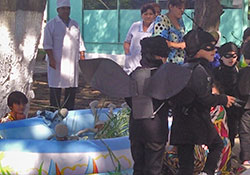World Malaria Day 2011 – success and challenges in the fighting against malaria disease in Tajikistan

WHO/Nargis Saparova
World Malaria Day (25 April) is one of the most important and key elements in raising awareness of the population on issues related to the disease and measures for its prevention. World Malaria Day is a day when we are together and we can join the global fight and say "no" to this disease. This year, the theme for World Malaria Day is "progress and results", which requires additional efforts of the international community to reduce malaria deaths by 2015.
Around 3.3 billion people - half the world's population - is at risk of malaria. Annually, there are about 250 million malaria cases and 880 000 deaths from the disease. The heaviest burden of malaria lies in Africa south of the Sahara. One in five (20%) of child deaths in Africa are due to malaria. A child dies every 30 seconds from malaria in Africa. The disease also infects humans in Asia, Latin America, the Middle East and even parts of Europe.
In Tajikistan, the malaria situation began to deteriorate in mid-1990s in connection with the termination of antimalarial activities throughout the country. With support from WHO/Europe, the Ministry of Health developed and adopted a national programme to combat tropical diseases (malaria) in 1997-2005. With a view to effectively conduct antimalarial activities, WHO/Europe along with governmental and nongovernmental organizations have been allocated the necessary funds to purchase medicines, insecticides, diagnostic techniques and equipment. Antimalarial activities have been significantly strengthened with the financial support of several international organizations (ACTED, MERLIN, USAID, UNICEF) and the governments of Japan, Norway and Italy. Since 2006 the country began the implementation of the grant of Global Fund to Fight against HIV/AIDS, Tuberculosis and Malaria under the newly adopted national program to fight tropical diseases (malaria) in 2006 and 2010. As part of this grant, WHO/Europe provides comprehensive technical assistance on planning, implementation and evaluation of ongoing anti-malaria activities, enhancing the capacity of health workers to monitor and evaluate activities, treatment and prevention of malaria, strengthening the entomological services, conducting research on malaria and strengthening epidemiological surveillance.
“The commitment to sustain a focus on malaria is a key element in achieving the results and combating the disease”, stressed Dr Pavel Ursu, WHO Representative/Head of the WHO Country office in Tajikistan. “Calling all sectors of society to learn from successes, strengthen partnerships, build program capacity and enhance awareness, knowledge and mobilize financial resources to accelerate malaria control towards its eventual elimination is a major public health matter. We need to make sure that delivering effective and affordable protection and treatment to all people at risk of malaria is an essential in protection against this disease”.
Progress has been made in malaria control in Tajikistan over the past 10 years. In 2010 a national programme for elimination of malaria for 2011-2015 was developed and adopted, whose ultimate goal is the elimination of the P.vivax malaria by 2015.
Around 3.3 billion people - half the world's population - is at risk of malaria. Annually, there are about 250 million malaria cases and 880 000 deaths from the disease. The heaviest burden of malaria lies in Africa south of the Sahara. One in five (20%) of child deaths in Africa are due to malaria. A child dies every 30 seconds from malaria in Africa. The disease also infects humans in Asia, Latin America, the Middle East and even parts of Europe.
In Tajikistan, the malaria situation began to deteriorate in mid-1990s in connection with the termination of antimalarial activities throughout the country. With support from WHO/Europe, the Ministry of Health developed and adopted a national programme to combat tropical diseases (malaria) in 1997-2005. With a view to effectively conduct antimalarial activities, WHO/Europe along with governmental and nongovernmental organizations have been allocated the necessary funds to purchase medicines, insecticides, diagnostic techniques and equipment. Antimalarial activities have been significantly strengthened with the financial support of several international organizations (ACTED, MERLIN, USAID, UNICEF) and the governments of Japan, Norway and Italy. Since 2006 the country began the implementation of the grant of Global Fund to Fight against HIV/AIDS, Tuberculosis and Malaria under the newly adopted national program to fight tropical diseases (malaria) in 2006 and 2010. As part of this grant, WHO/Europe provides comprehensive technical assistance on planning, implementation and evaluation of ongoing anti-malaria activities, enhancing the capacity of health workers to monitor and evaluate activities, treatment and prevention of malaria, strengthening the entomological services, conducting research on malaria and strengthening epidemiological surveillance.
“The commitment to sustain a focus on malaria is a key element in achieving the results and combating the disease”, stressed Dr Pavel Ursu, WHO Representative/Head of the WHO Country office in Tajikistan. “Calling all sectors of society to learn from successes, strengthen partnerships, build program capacity and enhance awareness, knowledge and mobilize financial resources to accelerate malaria control towards its eventual elimination is a major public health matter. We need to make sure that delivering effective and affordable protection and treatment to all people at risk of malaria is an essential in protection against this disease”.
Progress has been made in malaria control in Tajikistan over the past 10 years. In 2010 a national programme for elimination of malaria for 2011-2015 was developed and adopted, whose ultimate goal is the elimination of the P.vivax malaria by 2015.



